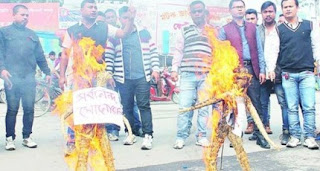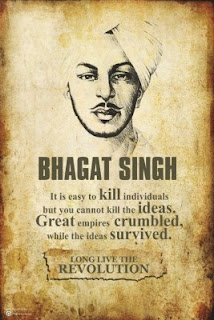Who Would Disagree
Demonetisation was indeed a bold move. It definitely shocked the corrupt. Hoarded money became useless in a day for the bureaucrats, Govt. servants, businessmen and the terrorists.I am not sure about the constitutional validity of the secrecy and the sudden-ness of the decision, however, I don't think anybody would disagree with the fact that it was required to be a surprise.
Yet, I would stick out my neck and say that #Demonetisation is an example of thought myopia, pompous ignorance and a gigantic failure of the Govt. machinery. Such inefficiencies in the Govt machinery of 70 years is scary and unpardonable.
What are the problems with Demonetisation?
Cash Economy
India is primarily a cash economy where black money is not perceived to be a moral issue.
Giving a bribe is considered as an essential expense for personal and business favours. The marriage potential of a boy increases when he gets a Govt job with an opportunity to make 'outside money'.
Trading business thrives on black money because of inefficient / corrupt indirect tax departments and complex rules leading to ignorance and procrastination. It is impossible to purchase 100% of the products with gate permits and tax invoices for trading business. This creates hard-earned unaccounted cash with businessmen for future business and purchase. This un-accounted cash is very different from the black money generated from bribery and political corruption.
The unaccounted money in the businesses stays in the growth of the businesses and therefore powers the GDP of the economy, whereas the black money generated from bribery is hoarded in the shape of properties, gold, offshore deposits etc., and some part of it powers the consumption in the economy. Consumption is important but not as important as the building of the GDP of the nation.
Demonetisation has simply ignored the overwhelming cash economy and the various kinds of black money available in the country that is serving different purposes in the running of the economy of the country. It didn't understand the social and psychological meaning of corruption that has evolved in the Indian societies since Independence, before deciding on demonetisation.
Lack of Research
I wonder if the Government tried to understand the meaning of demonetising 85% of the currency in circulation.
When we understand the reality of the existence of the cash economy, it becomes clear that documented data with RBI and other Govt. departments would be insufficient for any conclusive understanding about the negative effect of demonetisation. So, it was absolutely necessary for the Government to have undertaken primary research at the 'mandis' and other business centres to assess the importance of cash, perhaps black transactions in the life of an ordinary citizen, and the quantum of societal impact of a sudden disappearance of cash. If that reality was taken into account, the Govt agencies would have found better ways to do demonetisation and remonetisation.
Lack of a Roadmap
BJP and its supporters are saying that demonetisation is part of a bigger roadmap and in the long run when everything else falls in place, the country will benefit. That may be true, but clearly demonetisation exercise per se didn't have a roadmap for itself.Any project, however small requires a roadmap to successfully implement itself. It has a starting point and an end point. Demonetisation didn't have a starting point. It was announced without any preparation in the name of maintaining secrecy. For instance, the Govt could have printed new notes for Rs. 50, Rs. 100 and Rs. 500 from the start of the year citing any nationalistic reason without revealing the secrecy behind demonetisation. The Govt could have waived off the installation charges for POS machines, reduced the inter-change income for VISA / MasterCard, installed payment gateways and POS machines for all Government departments. All these steps could have never revealed the actual intention of demonetisation by the end of the year.
The way it was implemented reeks of a knee jerk decision following an emotional high of discovering a great strategy, thereby forgetting all restraints that a Govt process should have followed. It is clear that it was not decision by a regulatory system, but a decision from a group of people who are neither part of the bureaucracy, nor have the experience of the processes it follows.
No Consumer Understanding
Every society evolves in a certain way. India has evolved in a particular way too. Demonetisation simply ignored consumer behaviour and the need to understand the citizens of India. It didn't expect the creativity that can stem out of immoral minds of the corrupt value-less society of India. The power of money and the large population of Indians that had the weakness for it have wrecked havoc against the intentions of demonetisation to make black money invalid in one stroke.Large sums of black money were shown as working capital, large sums of black money were deposited using idle accounts of dead citizens, Jan Dhan accounts etc, large sums of black money were paid for services in advance and large sums of money were shown as income of the current financial year paying the normal tax slabs. Some have used Demand Drafts to exchange old currencies. There would be thousand other ways utilised to convert black money into white money. It is no surprise that over 13 lakhs of 15.4 lakhs have already come into the banking fold as I write this on 17th December 2016.
Even the logic of introducing Rs. 2000 to quickly fill in the currency vacuum backfired, when immoral Indians found ways to siphon out new notes from the very banking system.
Lack of technical knowledge
The fact that the size and design of the new currency note didn't consider the capabilities of the largest dispenser of cash - the omnipresent ATMs, is unpardonable. The blunder that lead to wide scale public inconveniences and to unnecessary costs to the banks' P&L in recalibrating the ATMs could have been easily avoided.
Thought Myopia, Pompous Ignorance
The honest and the poor Indians have now lost faith in the RBI, in the banking system and in the very currency. Still the pompous ignorants is living in a dream of hope that Mr. Modi can do no wrong.
Scary Governance
Indian Governance, its bureaucracy has evolved, and is evolving from 1947 when we became Independent. It was structured around rules and protocols so that democracy is preserved, equality, secularism and justice is preserved. The processes of parliament and many other committees of checks and balances were thought to ensure that correct decisions are taken by the Government and the bureaucracy.Demonetisation has brought to light a very scary scenario. A scenario where a single man, or at best, a group of men can overthrow the bureaucratic checks and balances to introduce to the public what they think is right for the public.
A scenario where sycophancy and fear of political power has reached dizzying proportion to make the whole bureaucracy look like fools. It was never so even in the heights of corruption during the Congress regime.
Conclusion
There would be a few good outcomes of demonetisation. Bank deposits would increase, and RBI may get at least a lakh crore of additional tender for the Government to spend on welfare schemes (hopefully). However, it is clear that not a single rich guy with the probability of having black money died of heartache. It is clear that counterfeits machines have started in double the speed. It is clear that the source of black money is not impacted, or perhaps not as impacted as it was intended.It is clear that the poor had to ultimately bear the brunt of the ego of the powerful.
The scariest discovery of demonetisation is this new possibility of working around the established systems to introduce schemes that have such wide scale impact on public good and welfare. Hope our intellectuals and our seniors would understand this dangerous phenomena and take appropriate steps to invalidate such drastic sudden steps powered by whims and fancies.









